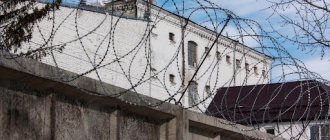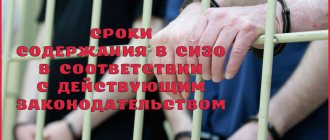After the trial, how is detention in a pre-trial detention center until the verdict comes into force?
Hello. After the trial, how is detention in a pre-trial detention center until the verdict comes into force?
Lawyer Antonov A.P.
Good afternoon According to Parts 3.1-3.4 of Article 72 of the Criminal Code of the Russian Federation, the time a person is held in custody is counted towards the term of imprisonment, with the exception of cases provided for in parts three.2 and three.3 of this article, at the rate of one day for: a) one the day of serving the sentence in a prison or correctional colony of strict or special regime; b) one and a half days of serving the sentence in an educational colony or a general regime correctional colony; c) two days of serving the sentence in a colony settlement. The time a person is held in custody is counted towards the term of imprisonment at the rate of one day per day in relation to those convicted of particularly dangerous recidivism of crimes; convicts for whom the death penalty by way of pardon has been replaced by life imprisonment or imprisonment for a term of twenty-five years; convicted for crimes provided for in Articles 205 - 205.5, parts three and four of Article 206, articles 208, 209, part four of Article 211, parts two and three of Article 228, articles 228.1, 229, 275, 276, 361 of this Code, and associated with carrying out terrorist activities are crimes provided for in Articles 277 - 279 and 360 of this Code. The time a person is in custody is counted towards the term of imprisonment at the rate of one day for one day in relation to the period of stay of a convicted person serving a sentence under strict conditions in an educational colony or a general regime correctional colony, in a penal or disciplinary isolator, a cell-type premises or a single cell-type premises type, in the case of applying penalties to a convicted person in accordance with the criminal executive legislation of the Russian Federation. The time a person is under house arrest is counted towards the period of detention pending trial and the period of imprisonment at the rate of two days under house arrest for one day of detention or imprisonment. According to the general rules established by Part 3 of Article 128 of the Code of Criminal Procedure of the Russian Federation, the period of detention is calculated from the moment of actual detention. Taking into account the provisions of Part 9, Clause 4, Part 10, Art. 109 of the Code of Criminal Procedure of the Russian Federation and Art. 12 of the Convention on Extradition, upon election to a citizen of the Russian Federation who is on the international wanted list, in respect of whom the issue of extradition is being decided, a preventive measure in the form of detention is elected for a period of two months from the moment of detention, without specifying the end date of detention. This measure cannot be extended by Russian courts until transfer to the territory of the Russian Federation. The time during which a person was detained in the territory of a foreign state upon a request for his extradition to Russia is counted towards the period of detention, calculated from the moment of actual detention abroad by virtue of Art. 460 Code of Criminal Procedure of the Russian Federation. Thus, if the request for extradition is granted, the period of detention in connection with the extradition of the detainee to Russia and transfer to a pre-trial detention center at the place of the preliminary investigation due to the requirements of paragraph 4 of Part 10 of Art. 109 of the Code of Criminal Procedure of the Russian Federation must be counted towards the term of serving the sentence. According to the “Answers to questions received from the courts on the application of the provisions of Article 72 of the Criminal Code of the Russian Federation” (approved by the Presidium of the Supreme Court of the Russian Federation on July 31, 2019), the specified multiplicity factors do not apply to the stage of execution of a sentence that has entered into legal force. In particular, they do not apply: a) to the period of sending a convicted person to serve a sentence in a correctional institution after the sentence enters into legal force; b) to the period of detention of the convicted person in connection with his arrest (up to 48 hours) on the grounds provided for in Part 2 of Article 30, Part 4 of Article 32, Part 4 of Article 46, Part 6 of Article 58, Part 4 of Article 60.2, Part 6 of Article 75.1 Penal Code of the Russian Federation; c) to the period of detention of convicted persons in the manner provided for in paragraphs 18 and 18.1 of Article 397 of the Code of Criminal Procedure of the Russian Federation, as well as when canceling a suspended sentence to imprisonment or parole; d) to the period of convicts’ stay in pre-trial detention centers in the manner prescribed by Article 77.1 of the Penal Code of the Russian Federation, if they did not choose a preventive measure in the form of detention. Thus, before the sentence enters into legal force, the period of detention is counted as a day and a half.
Sincerely, lawyer Anatoly Antonov, managing partner of the law firm Antonov and Partners.
Still have questions for your lawyer?
Ask them right now here, or call us by phone in Moscow +7 (499) 288-34-32 or in Samara +7 (846) 212-99-71 (24 hours a day), or come to our office for a consultation (by pre-registration)!
How will time spent in custody be counted?
The law provides for a complex but clear system for recording time. We are talking about recounting the time spent not only in a pre-trial detention center, but also, for example, in a temporary detention center before being placed in a pre-trial detention center.
One day in custody will be equal to:
- 3 days of correctional labor and restrictions on military service;
- 2 days in a colony-settlement, restriction of freedom, forced labor and arrest;
- 1.5 days in a disciplinary military unit, educational colony and general regime colony;
- 1 day in prison, a special or strict regime colony;
- 8 hours of compulsory work.
Those convicted of repeat offenses, serious and especially serious crimes, with a maximum punishment of ten years, are kept in maximum security colonies and prisons. In special regime colonies - those sentenced to life imprisonment. True, for exemplary behavior, prisoners even on particularly serious charges have the opportunity to end up in a colony settlement.
Why is this law needed?
Conditions of detention should not be more severe than the punishment that the court can impose - this is the position of the European Court of Human Rights.
Back in 2008, this was indicated in the explanatory note to the bill. The conditions in a pre-trial detention center are more stringent than in a general regime colony or a colony-settlement. In a colony, a person spends a lot of time in the fresh air, he can work and study. In a pre-trial detention center, apart from a short walk in a small courtyard, a person is in a confined space.
In accordance with the law, the preliminary investigation must take place within two months, but there are many opportunities to extend it - up to a year or more. When the investigation is completed and the prosecutor's office has approved the charges, the case is sent to court - which can also take months. All this time the arrested person can be kept in a pre-trial detention center.
The explanatory note also speaks of the “current lack of opportunity” to bring conditions in the pre-trial detention center in line with international standards. This problem is still relevant today, so the “preferential” credit for time spent in a pre-trial detention center is also a form of compensation for people for being kept in inappropriate conditions.
Who won't get their deadlines recalculated?
- Convicted of repeat crime;
- Those sentenced to death - if the exceptional measure was replaced by life imprisonment or 25 years of imprisonment. Since 1996, Russia has had a moratorium on the death penalty.
Convicted under articles:
- About terrorism, promoting terrorism, calls for terrorism, undergoing training to commit terrorist attacks, participation in a terrorist community or organization, an act of international terrorism;
- About the taking of a hostage by an organized group, or resulting in the death of a person, as well as about the hijacking of an aircraft associated with terrorist activities.
- On the illegal production, sale or transfer of drugs, as well as the acquisition, storage, transportation, manufacture, processing of drugs on a large and especially large scale.
- About drug theft or extortion
- About high treason and espionage, an attack on the life of a statesman and public figure, violent seizure of power, armed rebellion, as well as attacks on persons and institutions enjoying international protection.
Article 109 of the Code of Criminal Procedure of the Russian Federation. Terms of detention (current version)
1. Detention during the investigation of crimes cannot exceed 2 months.
2. If it is impossible to complete the preliminary investigation within up to 2 months and in the absence of grounds for changing or canceling the preventive measure, this period may be extended by a judge of a district court or military court of the appropriate level in the manner established by part three of Article 108 of this Code, for a period of up to 6 months. A further extension of the term can be carried out in relation to persons accused of committing grave and especially grave crimes only in cases of particular complexity of the criminal case and if there are grounds for choosing this preventive measure by a judge of the same court at the request of the investigator, submitted with the consent of the head of the relevant investigative body for a subject of the Russian Federation, another head of an investigative body equivalent to it, or at the request of an investigator in cases provided for in part five of Article 223 of this Code, with the consent of the prosecutor of a subject of the Russian Federation or a military prosecutor equivalent to him, up to 12 months.
3. The period of detention over 12 months can be extended only in exceptional cases in relation to persons accused of committing especially serious crimes, by a judge of the court specified in part three of Article 31 of this Code, or a military court of the appropriate level at the request of the investigator, submitted with consent in accordance with the jurisdiction of the Chairman of the Investigative Committee of the Russian Federation or the head of the investigative body of the relevant federal executive body (under the relevant federal executive body), up to 18 months.
4. Further extension of the period is not permitted. An accused person held in custody is subject to immediate release, except for the cases provided for in paragraph 1 of part eight and parts eight.1 - eight.3 of this article.
5. The materials of the criminal case completed by the investigation must be presented to the accused in custody and his defense attorney no later than 30 days before the end of the maximum period of detention established by parts two and three of this article.
6. If, after the completion of the preliminary investigation, the materials of the criminal case were presented to the accused and his defense attorney later than 30 days before the end of the maximum period of detention, then upon its expiration the accused is subject to immediate release. At the same time, the accused and his defense attorney retain the right to familiarize themselves with the materials of the criminal case.
7. If, after the end of the preliminary investigation, the deadlines for presenting the materials of this criminal case to the accused and his defense attorney, provided for in part five of this article, were met, but 30 days were not enough for them to familiarize themselves with the materials of the criminal case, the investigator, with the consent of the head of the investigative body in a constituent entity of the Russian Federation or the head of another investigative body equivalent to it has the right, no later than 7 days before the expiration of the deadline for detention in custody, to file a petition to extend this period before the court specified in part three of Article 31 of this Code, or a military court of the appropriate level. If several defendants in custody are involved in the criminal proceedings, and 30 days was not enough for at least one of them to familiarize themselves with the materials of the criminal case, then the investigator has the right to file the specified petition in relation to that accused or those accused who have familiarized themselves with the materials of the criminal case. case, if there is no longer a need to apply detention to him or them and there are no grounds for choosing another preventive measure.
8. A petition to extend the period of detention must be submitted to the court at the place of the preliminary investigation or the place of detention of the accused no later than 7 days before its expiration. The decision to initiate a petition sets out information about the investigative and other procedural actions carried out during the period after the selection of a preventive measure or the last extension of the period of detention of the accused in custody, as well as the grounds and motives for further extension of the period of detention of the accused in custody. The period specified in the decision to initiate a petition for which the detention of the accused is extended in custody should be determined based on the scope of investigative and other procedural actions given in this decision. If one of the reasons for extending the period of detention of the accused in custody is the need to carry out investigative and other procedural actions given in previous petitions, then the decision to initiate the petition shall indicate the reasons why these actions were not carried out within the previously established time limits for keeping the accused in custody. A copy of the resolution on the extension of the period of preliminary investigation or inquiry in a criminal case is attached to this resolution. The judge, no later than 5 days from the date of receipt of the petition, based on an assessment of the motives given in it, as well as taking into account the legal and factual complexity of the materials of the criminal case, the total duration of pre-trial proceedings in the criminal case, the effectiveness of the actions of officials of the preliminary investigation bodies and the timeliness of the investigation and other procedural actions takes, in the manner prescribed by parts four, six, eight and eleven of Article 108 of this Code, one of the following decisions:
1) on extending the period of detention for the period necessary to complete the acquaintance of the accused and his defense attorney with the materials of the criminal case, sending the criminal case to the prosecutor with an indictment, indictment, indictment or a resolution to send the criminal case to court for the application of compulsory medical measures nature, as well as for the prosecutor and the court to make decisions on the received criminal case, with the exception of the case provided for in part six of this article. The decision to extend the period of detention indicates the date until which the period of detention is extended. The court has the right to extend detention for a shorter period than specified in the decision to initiate a petition if it considers it sufficient to carry out the scope of investigative and other procedural actions specified in this decision. Extension of the period of detention in the case provided for in part seven of this article is allowed each time for no more than 3 months;
2) to refuse to satisfy the investigator’s request and to release the accused from custody. If a request to extend the period of detention in relation to the accused is refused, the judge, on his own initiative, has the right, if there are grounds provided for in Article 97 of this Code, and taking into account the circumstances specified in Article 99 of this Code, to choose a preventive measure in relation to the accused in the form of a ban certain actions, bail or house arrest.
8.1. In a criminal case sent to the prosecutor with an indictment, indictment, indictment or a resolution to send a criminal case to the court for the application of a compulsory measure of a medical nature, at the request of an investigator or investigator, initiated in the manner established by part three of Article 108 of this Code and part eight of this article, the period of prohibition of certain actions, the period of house arrest or the period of detention may be extended to ensure that the prosecutor, as well as the court, makes decisions on the received criminal case for a period, the duration of which is determined taking into account the terms provided for in part one of Article 221, or part first article 226, or part one of article 226.8, as well as part three of article 227 of this Code.
8.2. If the prosecutor returns the criminal case to the investigator in accordance with paragraph 2 of part one of Article 221 or paragraph 2 of part five of Article 439 of this Code and the investigator appeals this decision in accordance with part four of Article 221 of this Code, as well as the return of the criminal case to the investigator in accordance with paragraph 2 of part one of Article 226, paragraph 2 or 3 of part one of Article 226.8 of this Code and an appeal of this decision by the investigator in accordance with part four of Article 226 or part four of Article 226.8 of this Code at the request of the investigator or interrogator, initiated in the manner established by part three of Article 108 of this Code and part eight of this article, the period of prohibition of certain actions, the period of house arrest or the period of detention may be extended to ensure that a higher prosecutor, as well as the court, makes decisions on a received criminal case for a period, the duration of which is determined taking into account the terms provided for in part fourth article 221, or part four of article 226, or part four of article 226.8, as well as part three of article 227 of this Code.
8.3. In the case provided for in part two.1 of Article 221 of this Code, at the request of the prosecutor filed before the court during the pre-trial period no later than 7 days before the expiration of the period of prohibition of certain actions, the period of house arrest or the period of detention, the period of these preventive measures may be extended up to 30 days.
9. The period of detention during the pre-trial proceedings includes the period of detention during the preliminary investigation and the period of detention during the consideration of the criminal case by the prosecutor until he makes one of the decisions provided for in part one of Article 221, part one of Article 226, part first article 226.8 and part five of article 439 of this Code. The period of detention during the preliminary investigation is calculated from the moment the suspect or accused is taken into custody until the criminal case is sent to the prosecutor with an indictment, indictment, indictment or a resolution to send the criminal case to court for the application of a compulsory medical measure.
10. The period of detention also includes the following time:
1) for which the person was detained as a suspect;
1.1) the prohibition provided for in paragraph 1 of part six of Article 105.1 of this Code, at the rate of two days of its application per one day of detention;
2) house arrest;
3) forced stay in a medical organization providing medical care in an inpatient setting, or in a medical organization providing psychiatric care in an inpatient setting, by a court decision;
4) during which the person was detained in the territory of a foreign state upon a request for legal assistance or for his extradition to the Russian Federation in accordance with Article 460 of this Code.
11. Upon expiration of the maximum period of detention in the cases provided for in paragraph 4 of part ten of this article, and if it is necessary to conduct a preliminary investigation, the court has the right to extend the period of detention of a person in the manner established by this article, but not more than for 6 months.
12. In the case of repeated detention of a suspect or accused in the same criminal case, as well as in a criminal case connected to it or separated from it, the period of detention is calculated taking into account the time spent by the suspect or accused in custody earlier.
13. Consideration by the court of a petition to extend the period of detention of the accused in custody in his absence is not allowed, except when the accused is undergoing an inpatient forensic psychiatric examination and other circumstances precluding the possibility of his being brought to court, which must be confirmed by relevant documents. In this case, the participation of the accused’s defense lawyer in the court hearing is mandatory.
14. In the case provided for in part thirteen of this article, the judge makes a decision to consider the issue of extending the period of detention in the absence of the accused, indicating the reasons why the presence of the accused is impossible.
Who will sit longer because of the new law?
The new law worsened the situation of some convicts. Firstly, he equated two days under house arrest to a day in custody and imprisonment. Previously, a day in custody was considered a day locked up at home.
Secondly, “time flows” according to the one-to-one formula for convicts who end up in penal colonies in a punishment cell or a cell-type room. Practice shows that it is virtually impossible to challenge the imposition of disciplinary sanctions on prisoners - who are brought to isolation wards.
There are many examples when prisoners, through the courts, on the initiative of jailers, have their conditions of detention tightened: for example, from a settlement to a general regime or from general to strict. Such measures were applied to anti-fascist Alexei Sutuga, nationalist Igor Stenin and other political prisoners.
And this, too, is virtually impossible to dispute. If previously this led to a deterioration in the conditions of imprisonment, now it will lead to the fact that “undesirable” prisoners will serve even longer than they could.
What will the new law lead to?
Only practice will tell. The FSIN hopes that it will help relieve the congestion in pre-trial detention centers, many of which are “over-limited” - that is, they hold more prisoners than normal. Human rights activists hope that investigators will keep fewer people behind bars before trial. But there is an opinion among security officials that, on the contrary, many will try to stay in a pre-trial detention center for as long as possible: they will have to spend less time there than in a general regime colony or a colony-settlement. In any case, it is expected that, thanks to the new law, approximately one hundred thousand prisoners will have their sentences reduced. This is the main reason for his support from human rights activists.









